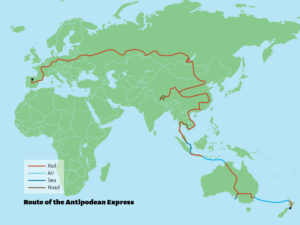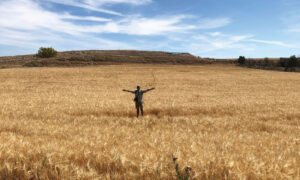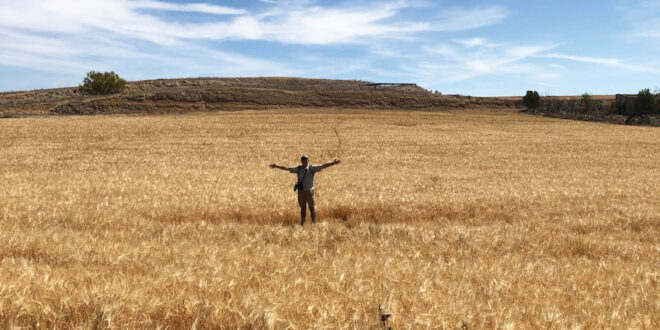Images & text extracted from Antipodean Express: A journey by train from New Zealand to Spain by Gregory Hill, published by Exisle Publishing, RRP: $44.99
Tap tap tap!
‘Okay, let’s take it from the top again! Second violins, you’re too slow. Try to keep up!’ Orchestra rehearsal. We were in the cramped and noisy orchestra pit beneath the stage of the Sydney Opera House, preparing for The Australian Opera’s next production of the 1980 season. I was an impressionable young French horn player in the ponderously titled Australian Elizabethan Theatre Trust Sydney Orchestra. While the Maestro whipped the second violins into shape, my mind lowered a curtain on the opera house and pulled up a desolate scene of tundra and snow with a long train snaking through it.
A horn-section colleague had just been regaling me in the coffee break with his madcap plan to travel on the Trans-Siberian Railway across Russia from Khabarovsk to Moscow. A sort of back-door entry to Europe, and rather difficult to achieve at the height of the Cold War and the recent Soviet invasion of Afghanistan. My colleague, a rather eccentric chap with a twirly moustache and a Citroën DS car, was nearing retirement and could afford the time and money to attempt the journey. I was at the very start of my career, could afford neither, and listened in envious awe. The remainder of the day was consumed by visions of birch trees, balalaikas and borscht instead of the reality of crotchets, quavers and clefs. Thank goodness for the wayward second violins.
I moved on from that orchestra, and I didn’t keep up with my erstwhile colleague. I don’t know if his dream came to fruition, but he had certainly lit a slow-burning candle in me. One day in the distant future, when I no longer have to turn up in the pit or on stage every day, I would find myself on the Trans-Siberian Railway.
•
Twenty years later I met my wife to be, Anne, and I flew with her to Germany to meet her family who live there. The Trans-Siberian back door to Europe floated to the surface again and flowered into a potential train trip all the way from Wellington, where we were now living, to Anne’s home town of Ludwigshafen am Rhein.

There was an old primary-school atlas anchored in my memory, haunting me. I remember it had a page with New Zealand superimposed on its upsidedown antipodes, Spain. The antipodes is the place at the exact opposite point on the globe to where you are standing now. Wellington corresponded fairly closely with Salamanca. This always intrigued me. The train trip fantasy gradually extended beyond Ludwigshafen to Wellington’s approximate antipodes in Salamanca.
Then the arrival of Google Earth led me to work out the exact coordinates of our house. From there it was a no-brainer to find the same latitude north instead of south, and the same longitude plus or minus 180 degrees, and there was a spot in Spain, absolutely directly beneath the floorboards of our house. It was somewhere next to a motorway in the middle of nowhere, halfway between Salamanca and Valladolid, in the region of Castilla y León. Zooming in a bit revealed a village nearby. Alaejos. The antipodes of our living room was in a wheatfield a couple of hundred metres north of Alaejos.
This wheatfield became the destination of our railway journey. It’s 13,000 kilometres away straight through the Earth under our feet, but we travelled 38,000 kilometres to get there in 78 days; 31,000 kilometres of that was by train.
We live on an island at the southern end of the Pacific Ocean, so there were compromises to get to our antipodes by train, but remarkably few. The only flights (they were unavoidable) were in and out of Australia. In South East Asia there were some buses and a ship too. We made a number of detours from the route by road, but we always returned to the last train stop to continue the rail journey. From Vietnam onwards, it was rail all the way on the uninterrupted thread of steel from Ga Sài Gòn, Saigon Station, through Lhasa to Salamanca for Alaejos, and, incidentally, on to London Heathrow Airport Terminal 2.
To read more about The Antipodean Express, click here









Join the Discussion
Type out your comment here:
You must be logged in to post a comment.